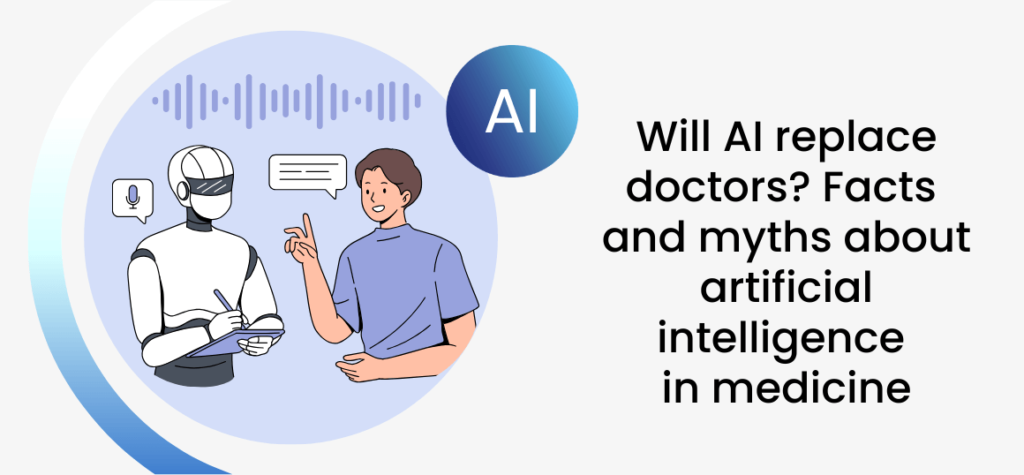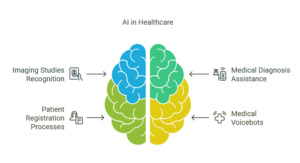Will AI replace doctors? Facts and myths about artificial intelligence in medicine

Will AI replace doctors? Facts and myths about artificial intelligence in medicine
AI skeptics warn that doctors will soon be replaced by artificial intelligence. Of course, at this point, that is not possible — and it seems unlikely that such a complete transformation will ever occur. So why do these harmful myths continue to spread? In this article, we take a closer look at this issue. Here are the facts and myths about AI in medicine.
Myth #1 – Artificial intelligence will replace doctors
Will AI replace doctors? Is the future of medicine driven solely by AI? One of the most damaging myths is the belief that AI technology will soon take over doctors’ jobs. Many unaware patients may believe this, leading to distrust of various AI applications in the healthcare sector. Currently, AI tools and algorithms are not capable of replacing medical specialists, and it seems unlikely that such a transformation will ever happen. This is because the skills of doctors remain crucial in the processes of diagnosing diseases and making treatment decisions. Today, AI can support healthcare professionals, but it is not — and is unlikely to become — a full substitute for the work of a doctor.
Myth #2 – AI is the cure-all for the healthcare sector
AI enthusiasts in the healthcare industry suggest that artificial intelligence could be the ultimate solution to fix the entire sector. However, this is also a misconception. There is no doubt that properly implemented AI tools can improve the quality of healthcare — for example, by analyzing and collecting vast amounts of data or handling parts of communication with patients. Nonetheless, AI is not a cure for all the challenges the healthcare system faces today. From experience, we know that these challenges are not limited to the Polish National Health Fund (NFZ) — they are present in healthcare systems worldwide. In short, AI can be an invaluable support tool, but it is not the answer to solving all the industry’s problems.
Fact #1 – AI streamlines doctors’ work and speeds up diagnostics
Now, let’s move on to the facts, which are hard to dispute. AI significantly enhances the work of medical specialists and accelerates the diagnostic process in medicine. Modern AI tools can, among other things, recognize imaging studies such as X-rays, mammograms, and CT scans. They can also assist in making effective medical diagnoses, providing valuable support to doctors in their daily work. Additionally, AI is used for patient registration processes, easing the workload for medical administrative staff. A great example of this is the use of medical voicebots.

Fact #2 – Artificial intelligence in medicine supports personalized treatment
Proper use of artificial intelligence helps personalize treatment, which improves both patient satisfaction and the effectiveness of services provided by medical facilities. AI can quickly analyze large datasets, including test results, medical records, patient histories, and various other health data. Crucially, it does this with a focus on the individual patient, tailoring insights and recommendations to their specific needs. This is a valuable asset in the daily work of doctors and nurses, helping enhance the quality of care and better align treatments with individual requirements — a key principle in modern medicine.
Should we be afraid of implementing AI in medicine?
Absolutely not. Using AI in medical diagnostics, patient registration, or data analysis helps speed up the work of healthcare professionals. As a result, they gain valuable time that can be dedicated to patient care. In practice, this means AI allows medical institutions to serve more people in need, increasing overall efficiency. That’s one of the main reasons why there’s no need to fear the implementation of AI tools in this sector — a point we also highlighted in our article about the doctor-patient relationship in the age of AI.
How to implement artificial intelligence in healthcare?
The implementation of artificial intelligence in healthcare must not be done thoughtlessly. Even the most advanced tools can make mistakes, which is why AI should serve as support for medical professionals — not a replacement. This should reassure patients: AI will not replace their general practitioners or medical specialists. While the digital transformation of healthcare is both necessary and already underway, it must be carried out thoughtfully and under the supervision of ministry-level experts. The primary goals are to ensure patient safety and improve the quality of services provided by medical facilities.
At EasyCall, we have many years of experience in implementing AI technologies in the medical sector. Our clients include institutions such as the Ministry of the Interior and Administration Hospital in Kraków, Gizińscy Medical Center, Medica Kielce, and Omega Medical Clinics. Get in touch with our expert, who will assess the potential for AI implementation in your medical facility.
